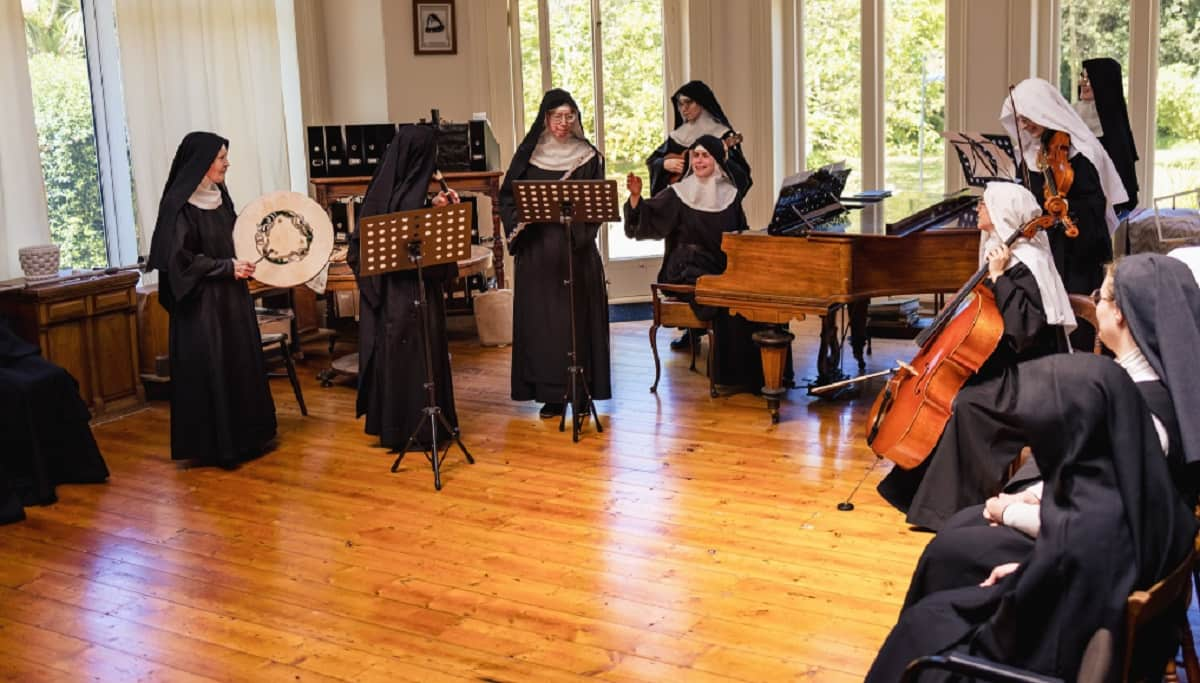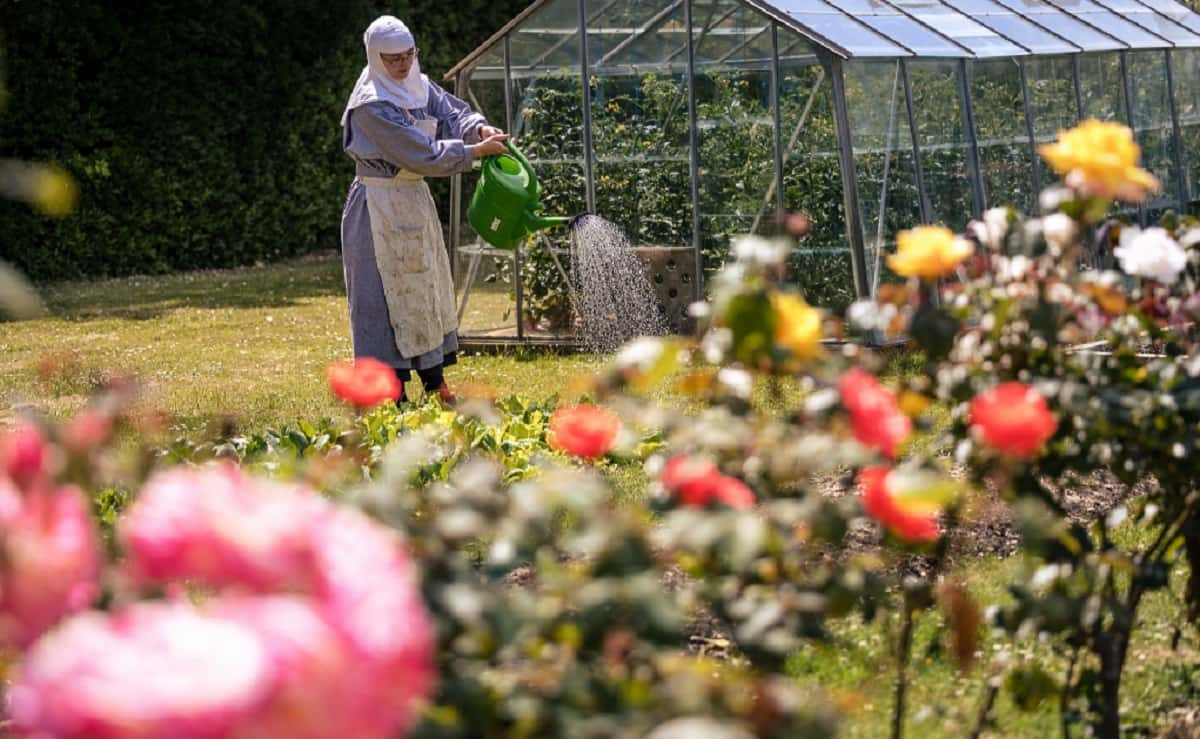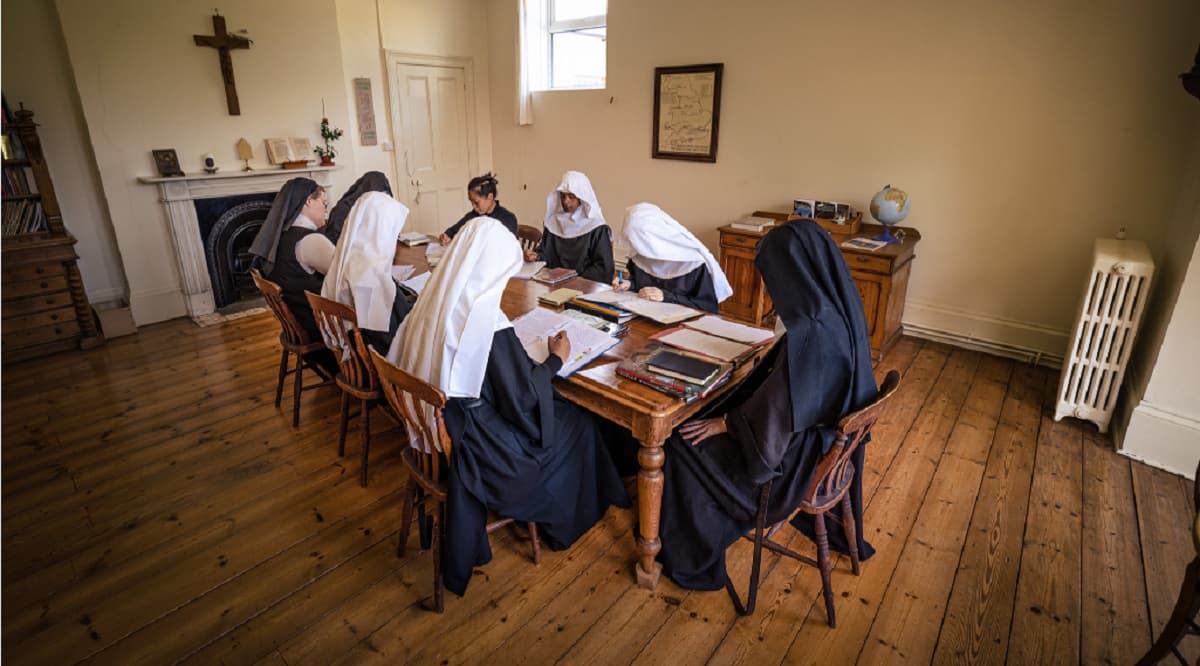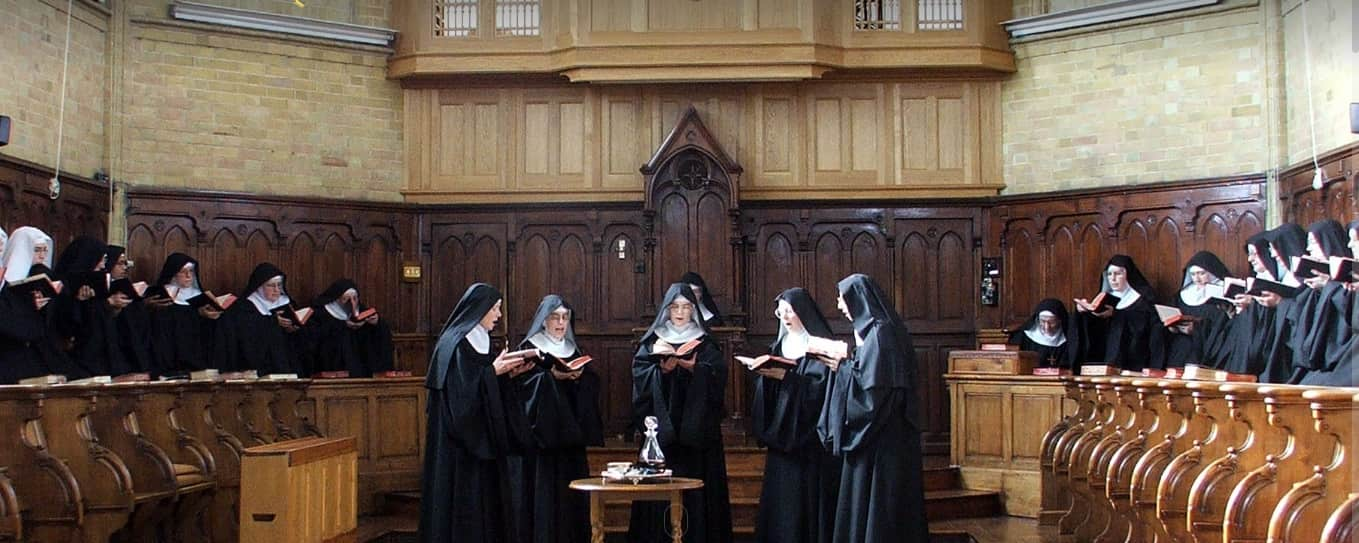In the south of England, specifically on the Isle of Wight, a place close to the coast but sparsely inhabited, there is a striking and lively monastic life. On the outskirts of the town of Ryde and in a beautiful natural setting facing the sea is the Abbey of Santa Ceciliawhere a large group of Benedictine nuns live, many of them quite young, from the solesmes congregation.
These nuns of contemplative life stand out not only for their number and for the strength of some young women who manage to transcend the walls of the abbey. They are already internationally known for their cultivation of gregorian chantas the prior of the Valley of the Fallen explained to ReL, the Father Santiago Canterafrom the same congregation as these Ryde nuns.
The beauty of these female voices that pray while singing in Gregorian It is a characteristic of the Solesmes congregation, to which is added the special care of the liturgy and the special relationship with the Roman pontificate.
Nevertheless, What is so special about this community of Benedictine nuns of an abbey created just over 70 years ago to attract young girls from England and elsewhere to the contemplative life?
“There are as many different vocational stories as there are sisters in the community. Some felt close to God from childhood; for others, he became a real person only after spending years outside the Church, or in it, but without having any special feelings about it. Some people visited the monastery once and that was enough: it was love at first sight and they felt they had to go inside. For others there was a period of discovery and carefully weighing the pros and cons, until they took the leap…”, explain these Benedictines from the Abbey of Santa Cecilia in Ryde.
Based on the experience they have accumulated and always supported by the Benedictine tradition, the nuns of this abbey offer good help through their website to any young girl who is discerning a possible vocationsome points that are applicable to religious life in general, and not only for this order in particular.
This explanation is divided into four points.
1. Some of the characteristics of the call of Jesus
In the first place, from this abbey they remember that the call comes from Jesus and that “The Lord calls because he loves”. Second, vocation is a call “to a life of profound union with Christ”, so people who are called to this life “thirst in their hearts for something more.” And thirdly, they emphasize that “a vocation is an invitation that includes the sacrifice of oneself”leave everything for the Lord. But this sacrifice –they add- “united with Christ produces great joy”.
“A call to religious life it is an invitation to look beyond the things of this world, in all its goodness, in favor of the ultimate realities of heaven. Through the vow of poverty, Christ strips us of goods so that we can receive the riches of faith, the riches of God. By the vow of chastity, He sets us free for unconditional devotion to Christ as our Spouse. It is a call to greater love and spiritual fruitfulness. By the vow of obedience, He fully conforms our will to His. In this way, we anticipate heaven where everyone will live, in effect, as consecrated to Christ”, these Benedictines highlight about this religious vocation.
The nuns of the abbey of Santa Cecilia pray the Divine Office in Latin
Once this point has been clarified, the Ryde nuns do not hide that in general this generates a “struggle in the heart of those called”, a struggle between the grace of God, for which nothing is impossible, and the freedom of each one: “The Lord appeals to our free will and our love.”
But another very important aspect, according to them, is that “a vocation is never for one.” It is something more, it is “a mission, a task, a responsibility for others”, because “the Lord needs helpers for the salvation of the world”.
2. Some signs of a vocation
After a first more general point, the Benedictines of the Congregation of Solesmes illuminate some signs that can show a religious vocation, in addition to those already mentioned in the previous point.
-A feeling of restlessness and dissatisfaction: “A vocation is not a vision or an apparition; It is not an extraordinary message that we receive. It is much more an intimate encounter with Christ in the different circumstances and situations of life. There is often a nagging annoyance, a feeling that won’t go away, as if someone is knocking on the door of our heart or mind, especially in times of prayer, silence, and worship. In those moments we can perceive a voice, a voice without words, but very clear and penetrating. It is possible that you are finding less satisfaction in your work or social life, not because they are wrong, but because you feel that they are not enough.
-Difficulties: “People often ask if difficulties can be a sign of a vocation. Yes, those who want to serve the Lord and his church have and have always had difficulties to face, trials, temptations, etc. The devil knows the immense blessing for those who give themselves totally to the Lord. That is why it is normal, as the Lord himself said in the Gospel, for difficulties and obstacles to arise, both from within and from outside ourselves: doubts, fears, conflicts with parents, misunderstanding of others, etc.”

For the Benedictines of the Abbey of Santa Cecilia, music is a central aspect.
But, nevertheless, they show a help: “in order to overcome such difficulties, we must need trust, perseverance, courage and faith, a spirit of sacrifice. Above all, we need to trust in the Providence of God, because he knows ways that we do not know and nothing is impossible for him; he opens doors that cannot be opened. It is also normal to experience reluctance or occasional resistance to a genuinely divine vocation, and to feel the pull of alternatives. The ‘certainty’ of being called is not mathematical. It can coexist with moments of uncertainty, questioning, confusion, etc. There is, however, sufficient certainty to act”.
-The desire to be a consecrated person. “Often this desire is accompanied by a feeling of joy at the prospect of becoming a sister to do the Lord’s work. It is not always possible to explain this desire: it just seems like the right thing to do, the right way, the idea keeps coming back, even if it scares you or makes you think it would be impossible.”
3. Some aids for discernment
–Prayer and Worship: prayer brings the Lord closer and opens to his voice, the nuns recall.
–The Sacraments of the Eucharist and Reconciliation. Confession frees one from sin and weakness, which for this discernment can be of great help to clear up doubts, fears and shadows about essential questions about the meaning and purpose of life on earth. For its part, the Eucharist constantly deepens the relationship with Christ, which attracts his grace and strength.
-Simplicity and humility. The Benedictines of the Abbey of Santa Cecilia insist: “We cannot expect the Lord to give us a blueprint for our lives in advance. He shows us his plan step by step. And we can only see a little further. But being true to the light we have will bring us more light. When we do our duty each day, the Lord will show us our duty tomorrow, the day after tomorrow, next week, next month, next year. Being faithful in the little things will help us see our way into the future.”

-Share the life of a community. Religious communities offer the possibility of sharing their lives and being able to get to know them, through experiences of a few days with the community. “Such experiences can take a vocation out of the abstract and make it concrete, and are of great help in understanding the meaning of consecrated life. It can also help you come to a better understanding of yourself”, explain these nuns.
4. Some basic requirements for religious life
But at the same time that they show some help to know if someone is called to religious life, these nuns also remember some requirements when considering giving their lives.
–A love for Jesus and his Church. “The consecrated life is a life with Jesus at the service of the Church. More than workers, the Lord needs lovers, witnesses to his truth, beauty and goodness, spiritual fathers and mothers and not just teachers, shepherds and guides”, affirm the Benedictines.

-Will to train, to learn from others. Preparation for religious life according to the vows, like preparation for the priesthood, is a path of conversion and growth in faith. It is a way of developing the full potential of the human person. Each person is unique, and formation implies a deep respect and love for each one’s vocation and for the graces that work in each one. Saint Benedict in the Rule is very sensitive to this fact that different temperaments or circumstances require different responses to grace.
In this sense, they emphasize that “the Lord has given each person so many talents and characteristics, but these do not develop automatically.. It is important to see formation, above all, as a divine work, a supernatural process. The goal of all formation is a gradual transformation to the likeness of Christ, by the action of the Spirit helped by the maternal care of Our Lady, Mother of Jesus and of the Church, and our model in the following of Christ”.
-Basic physical and mental health. By the nuns’ own admission, serious medical conditions would make it difficult for someone to live and work as a consecrated person. The vocation to religious life supposes, then, not only a supernatural inclination or desire to embrace it, but an aptitude for its functions. God cannot act inconsistently. In other words, along with a desire, there must be an internal and external capacity, that is, the physical, psychological and moral capacity to live a certain way of life, and the external circumstances that allow it: adequate age, freedom from the bond marriage and other big responsibilities, including freedom from debt.
The Benedictines of Santa Cecilia cultivate Gregorian chant and their music now reaches any corner of the world thanks to technology.
An abbey, with young nuns and vocations, offers four helps to discover if God is calling you

